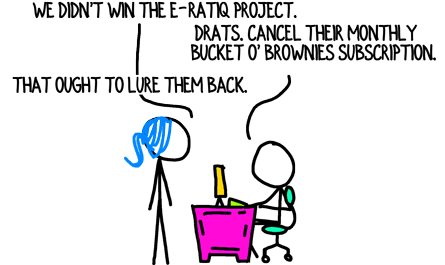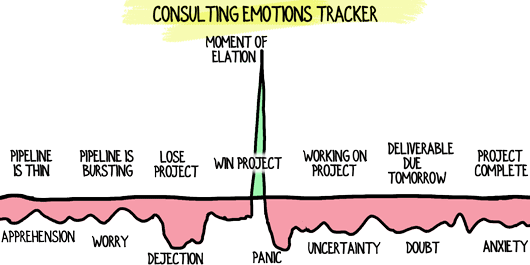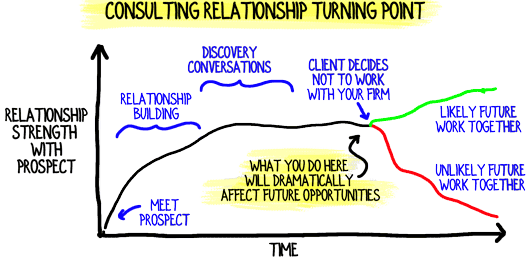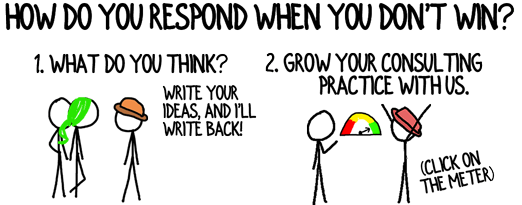Is there a best way to respond to a prospect when they tell you they won’t be awarding your consulting firm a project?
Of course there is.
Losing a project is frustrating. For instance, let’s say your consulting firm was contacted by the tech-focused, private equity group, E-Ratiq to potentially assist with one of their investments.
Since the PE group reached out to your consulting firm, looking for help, you assumed the project was a shoo-in. You are uniquely qualified to address the challenges faced by their portfolio company, Insular Thinking.
After numerous discovery conversations and a fair amount of research and thinking on your end, your consulting firm submits a proposal. You then patiently work your way through three rounds of challenging negotiations, led on Insular’s side by their CEO, Hugh Nowhin.
Three months and three proposal revisions later, you receive a two-line email from Hugh: “Thank you for your interest in working with Insular Thinking. We’ve decided not to move forward with your consulting firm.”
Ouch.
Now what?
It’s easy to become defensive, dejected or resigned when your consulting firm loses a project—particularly one you were banking on.
Some consulting firms try to fight for the project. (Maybe you could convince Hugh that his decision was ill-advised.) Unfortunately, that strategy rarely works and puts your relationship with the decision-maker at risk.
At the other end of the spectrum, some consulting firms walk away and never look back. (“To heck with Insular. We’ll never speak with Hugh again.”) Cutting off relationships is also not a winning strategy for your consulting firm.
My team and I discussed the best responses to losing a project and agreed on about eight or nine approaches that we’ve noted are consistently effective in building a consulting firm’s business (over time).
A few of those are listed below, and there’s a giant space for you to add in your ideas. Note that the responses aren’t mutually exclusive. You can (and probably should) incorporate all of them into your firm’s best practices.
Top 5 Responses When Your Consulting Firm Loses a Project
Congratulate and Connect
It always pays to congratulate your consulting prospect on their decision, even if you don’t agree with the path they’ve chosen. At the very least, you can acknowledge your loss graciously.
Then, you immediately lock in a time to reconnect with Hugh a few weeks or months down the road—at a time when he’ll have early indications of whether he’s achieving the results he wants without your consulting firm.
During your follow-up you’ll either learn something from Hugh’s success or have a chance to step back in and apply your superior ideas to Insular Thinking.
Accept Silver
Although your consulting firm didn’t win the gold medal–the project you were shooting for, Hugh may be able to award you a silver medal.
Are all of Insular’s desired outcomes and objectives addressed when they move forward without your consulting firm? If not, perhaps there’s room for a small project that will get you in the door with Insular and highlight your prowess to the investors at E-Ratiq.
Learn
Every time your consulting firm loses a substantial project, you should ask your prospect three questions:
- What were the criteria for deciding how you would move forward on this project?
- How did our consulting firm stack up against those criteria?
- Is there anything we could have done, or could do differently next time, that would allow us to win the project?
Request an Introduction
Usually your prospect harbors some level of guilt for turning you down, particularly if your consulting firm worked diligently over many weeks or months to win the project.
Help Hugh assuage his bad feelings by offering him the opportunity to provide a different, valuable service to your consulting firm: introductions. For instance, perhaps Hugh knows the leaders of other tech firms.
Introductions fuel your Network Core and lead to long-term business.
Your Strategy
How else do you respond when your consulting firm loses a project? Add your suggestions below.
Text and images are © 2024 David A. Fields, all rights reserved.

 David A. Fields Consulting Group
David A. Fields Consulting Group 




No insightful addition I’m afraid David – I just wanted to say that I LOVE your “Consulting Emotions Tracker”. So true. 👏
Even though the graphic understates the fun and joy many of us experience every day in this wonderful profession, it’s probably a good warning graphic for corporate folks considering starting their own consulting firm.
Thanks for your feedback on that illustration, Alan– very much appreciated.
We typically ask the questions you mentioned under Learn but if it isn’t a client we have worked with in the past we usually get crickets. Do you ask for the feedback in an email or do you ask for a short call to get the feedback? We have ask for a short call but.
Good question, Bruce. Phone call. If it’s a big deal in which you were emotionally vested, it’s best to have a third party ask the questions. I’m surprised you’re receiving no response unless you’re proposing to clients with whom you’ve built no relationship–for instance, via RFP.
So, one possibility to investigate is whether you’re building a relationship during the Discovery (a.k.a. Context Discussion) phase and/or whether you’re rushing to proposal too soon. That’s a very common pattern we see.
Of course, not every prospect will respond–heck, even the best prospects and clients can go AWOL. It’s almost as if they have lives and things to do that don’t involve our consulting firms. Weird.
I’m grateful you took a moment to ask that clarifying question, Bruce.
#3 – learn – is the biggest opportunity for me. When I’ve been able to congratulate the customer, reflect that I appreciated the opportunity to pitch, and then ask with a bit of humility for feedback – that has ALWAYS strengthened relationships, and also demonstrates a level of ‘class!’
Exactly, Ben. Part of the process is decoupling your emotions from the results and focusing, instead, on the opportunities. And, of course, on staying Right-Side Up and focused on building the relationship.
Your example of rising above the loss of a project and retaining humility is stellar. A fabulous reference point for other consultants, and I appreciate you sharing, Ben.
Just once – almost made a (local govt) customer cry with how humble we were! They were more afraid of a procurement challenge than anything, and were blown away with this approach
You rarely go wrong by being humble–unless along the way you forget to mention that you’re very good at what you can do and that you can help! Thanks for the additional example, Ben.
You nailed it, David, with your emotions-grid. That helps me identify the agonies I’ve chosen to avoid by slowing down my marketing/pursuit. Facing the fact of those emotions may incentivize me to get back in the game…… Meanwhile, still chuckling about your character and business names: “Hugh Nowhin” hahaha! And “E-Ratiq”. So much fun to read your posts. Thanks for helping us smile through the challenges!
If you can chuckle while you’re amidst the agonies, then you’re doing something right. (Or inhaling nitrous oxide). I’m glad you shared your reaction, Mary Ann, and even more glad that you’ll get back in the game!
This is spot on, love it! I am just starting out and while losing a gig sucks, I have been able to turn some of those around into continued conversations. I may not be playing the game right now, but I am sitting on the sidelines staying present and ready to jump in when called!
Congratulations on joining the world of consulting, Christi, and kudos to you for your upbeat attitude. Keep having the right conversations and listening to clients, then you’ll find yourself being the star of the game.
Keep me up to date with how you’re faring, Christi.